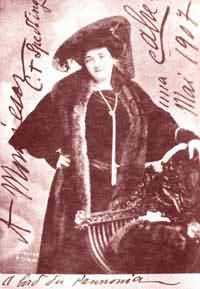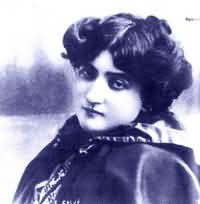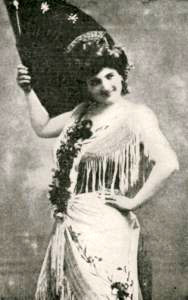Emma Calve |
||||
More information on their journey together can be found in Memoirs of European Travels Part II
Vivekananda wrote of her in his Memoirs of European Travel, "Mademoiselle Calvé is the foremost singer — opera singer — of the present day. Her musical performances are so highly appreciated that she has an annual income of three to four lakhs of rupees, solely from singing. I ...Calvé ... of French extraction, (is) totally ignorant of English.... "Mademoiselle Calve will not sing this winter, she will take a rest and is going to temperate climates like Egypt etc. I am going as her guest. Calve has not devoted herself to music alone, she is sufficiently learned and has a great love for philosophical and religious literature. She was born amidst very poor circumstances; gradually, through her own genius and undergoing great labour and much hardship, she has now amassed a large fortune and has become the object of adoration of kings and potentates! "There are famous lady singers, such as Madame Melba, Madame Emma Ames, and others; and very distinguished singers, such as Jean de Reszke, Plancon, and the rest — all of whom earn two or three lakhs of rupees a year! But with Calvé's art is coupled a unique genius. Extraordinary beauty, youth, genius, and a celestial voice — all these have conspired to raise Calvé to the forefront of all singers. But there is no better teacher than pain and poverty! That extreme penury and pain and hardship of childhood, a constant struggle against which has won for Calvé this victory, have engendered a remarkable sympathy and a profound seriousness in her life." Emma Calvé (1858-1942) was one of the famous opera singers of her day. Her date of birth is given from 1858 to 1864. Born in Madrid, she was trained as a French soprano and actress and was a pupil of Marchesi and Puget. In some ways she seems to owe her fame not only to her voice but to her taking the opera to a new lascivious low in her portrayal of Carmen, presenting as critic Henry E. Krehbiel wrote, "a woman thoroughly wanton and diabolically equipped with the wicked witcheries which explained, if they not palliate, the conduct of Don José. . . . In some respects [she] left abso tlutely nothing to the imagination." There is some doubt as to when she first met Swami Vivekananda. Some feel it was in 1894 in Chicago. Others think it was in 1899, during his second visit to the west. She has left a couple of reminscences of the Swami. And is the source for the Rockfeller and the Swami story, which is of somewhat doubtful veracity, which is true to some degree of most of her stories about the Swami. Calve looms large in the Swami's life when, on 24th October 1900, he left
Both Bois and Calve traveled together with the Swami on his trip to Egypt. Calve continued to sing until 1910 when she retired into obscurity. The Etude Magazine in October, 1909, wrote of her: Her first important appearance was at the Theatre Monnaie, in Brussels, September, 1882, where she made her debut as Marguerite in "Faust". Her first Paris appearance was as Bianca in Dubois; "Aben Hamet", at the Theatre Italien, December 16, 1884. After a tour through Italy she again sang in Paris as Lelia in Bizet's "Pecheurs des Perles", in 1889. She also created the role of Santuzza, at the first production of "Cavalleria Rusticana", in Paris, January 19, 1892, appearing later in the same year at Covent Garden, London, in this opera. It is, however, as Carmen that Calve will be remembered, and few who were present will forget the indescribable sensation she created in New York when she made her first appearance in this role, December 20, 1893. She made her New York debut as Santuzza a month previous to the "Carmen" production. She then toured the principal cities of Europe, meeting with uniform success wherever she went. Calve did not appear in opera during the past season, but she toured America, giving many concerts to delighted audiences.
Swami Vivekananda wrote of Calve: 'She was born poor but by her innate talents, prodigious labour and diligence, and after wrestling against much hardship, she is now enormously rich and commands respect from kings and emperors....The rare combination of beauty, youth, talents, and "divine" voice has assigned Calve the highest place among the singers of the West. There is, indeed, no better teacher than misery and poverty. That constant fight against the dire poverty, misery, and hardship of the days of her girlhood, which has led to her present triumph over them, has brought into her life a unique sympathy and a depth of thought with a wide outlook.'
After the Swami's passing away, Madame Calve visited the Belur Math, the headquarters of the Ramakrishna Mission. In old age she embraced the Catholic faith and had to give up, officially, her allegiance to Swami Vivekananda.
Emma CalveHer obiturary in Time Magazine Monday January 19, 1942 A Carmen Dies In her native Millau in southern (unoccupied) France, a white-haired woman of 83 died last week. For a generation of operagoers, Emma Calvé and Carmen had been synonymous.
Reminiscences of Swami Vivekananda by Emma Calve
|
- www.vivekananda.net edited by Frank Parlato Jr.
 Emma Calvé was the source of one of
Emma Calvé was the source of one of  Paris for the East, by way of Vienna and Constantinople as her guest. With them were Monsieur Charles Loyson (formerly Pere Hyacinthe) and his wife, Monsieur
Paris for the East, by way of Vienna and Constantinople as her guest. With them were Monsieur Charles Loyson (formerly Pere Hyacinthe) and his wife, Monsieur 